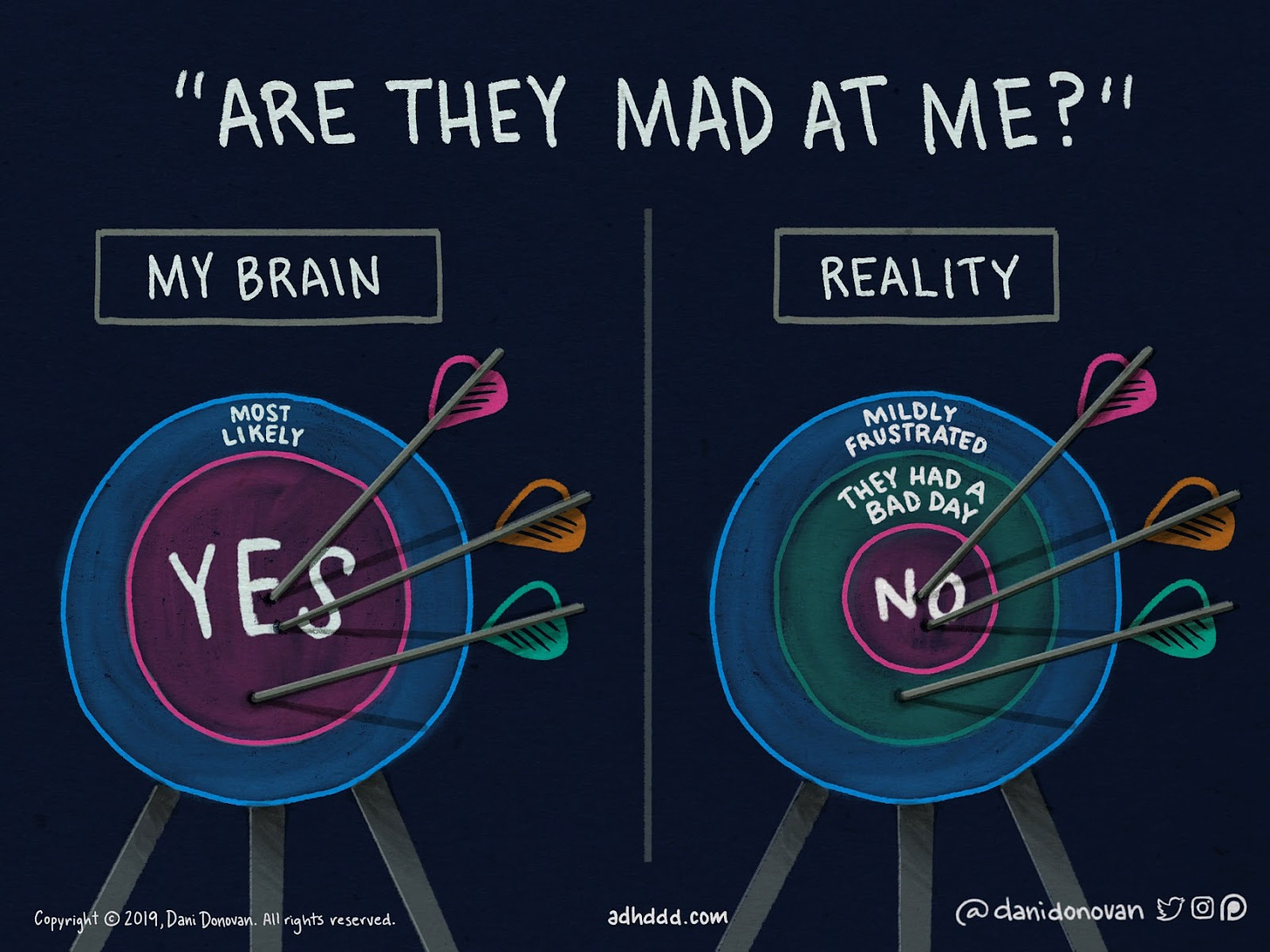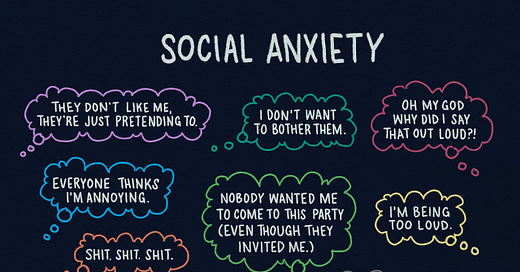#3 Overcoming ADHD social anxiety to ask for help
Allowing yourself to accept the kindness, care and insight from the people around you.
This is issue 3 in a 5 part series on how to re-write your inner critic. Skip my ramblings to 3 tips on how to ask for and accept help.
We focus on step 2 of 4 reshaping the voice of your inner critic this week. In step 1, we looked introspectively to gather data points about ourselves. In step 2 we look to our friends and colleagues for additional data points and reinforcement.
Take a self-assessment of product manager skills to reduce your ADHD insecurity by objectively identifying your strengths and weaknesses.
Ask others what your strengths are to help you build a self-image that is externally based. Your self-critic can’t argue with someone you admire.
Be matter-of-fact about your disability (or aspects of your role beyond your control if you don’t have a disability).
Create a story from the parts you found in steps 1-3 that best represents you.
Introduction
In this step of quieting the self-critic, we focus on letting external voices into our headspace. This is important because it gives us other data points to consider about ourselves that come from beyond the self-critic, doubt, or anxiety in our heads. It’s easy for those of us with ADHD or social anxiety to only hear the negative. The feelings of shame, fear, or self-doubt fire the same neurons in our brains over and over. Strengthening the synaptic pathways that tell us “we suck” (thanks, rumination). We can break this loop by adding voices from those who we respect and who we know care for us. If someone we look up to, says “you don’t suck”, then it’s gotta be true right? Think of it as “proof” we are greater than what we tell ourselves. Integrating external evidence to improve our self-image is the easy part though. The hard part is allowing ourselves to ask for and accept help.
Social anxiety and the ADHD brain
A common trait of ADHD is social anxiety. It could be the fear of meeting new people, being afraid to engage others because we think we might upset them, or thinking we’re not worthy of interactions with others. For me, it presents most often at work as being insecure with my ideas. I can be defensive or avoidant when developing a new idea or faced with a tough challenge. This social anxiety stems from my fear of being seen as “wrong” in the eyes of others. For the most part, I can overcome this through medication and exercise. However, when that doesn’t work and things get really bad, I experience what I like to call “drowning alone”.
“Drowning alone” happens when I am not willing to ask for help or not willing to accept the situation is beyond my control. This leads to me internalizing a negative outcome as my own personal failure. I then do my best to hide that failure from others; isolating myself. The “failure” could be a project that had a negative outcome. Sprinkle some shame and imposter syndrome and you have some great “drowning alone”.
I was too scared to approach my leadership or peers to objectively state what was happening. I would stay silent and my work would be perceived as underperformance. I’d avoid the matter (classic ADHD avoidance/procrastination) until something prompted action to address it. It ranged from negative actions such as reprimands, and stern talking to’s, to performance improvement plans. I’ve experienced them all thanks to my ability to drown alone.
My social anxiety and shame from a perceived failure prevented me from asking for the help I needed. Not only for the project to succeed, but also for me to succeed as a product manager (PM) and person. Nearly everything we do as PMs and life is a bet. Navigating ambiguity is a core reason for the role’s existence. Uncertainty and failure are integral parts of being a PM. Asking for help is not a failure, it’s an essential part of life. Don’t be afraid to reach out to others and be open to listening.

Hey, (insert name here) do I suck at my job?
During my journey of “Am I a bad product manager?” I started reaching out to colleagues and asked them this question. I wanted to know if being a PM was the right thing for me anymore. I was so despondent at the time, that my social anxiety didn’t stop me from asking for help (I don’t recommend waiting on getting this low to get help). I got out of my failure or success mentality and started focusing on understanding. I became focused on figuring out if I was a bad PM and what factors were preventing me from being a good PM; I was ready to listen to other people.
I called a principal engineer I worked with on a Tuesday afternoon. I remember the nervousness about the call as I walked outside to my lawn to talk to them. I bluntly asked the question “Do I suck as a Product Manager?”. They laughed, politely said no, and gave me a rundown of their perceptions of me and the environment I was in. They talked me off the crazy ledge. I repeated this exercise via phone and text with five other colleagues and friends. They all told me various reasons why I was a good PM and my abilities.
By listening, a picture of my strengths and abilities began to emerge. They became the data points that helped support my traits assessment and direction for the kind of PM I was. I added some new strengths to my list that I hadn’t thought of before. Such as the ability to talk publicly and organize communities. I also got to hear stories of how I had improved their lives. I like to think I’m a decent PM but, I know I’m a good person. My self-doubt and feelings of shame dropped dramatically. Other people believed in me and I brought positive experiences to others. That made my ADHD brain happy. Overcoming my social anxiety to ask for help brought me joy and confidence.
Conclusion
My friend Brandon likes to say that “Feedback is a gift”. For most people, it’s a hard gift to ask for and receive. For those of us with ADHD or any other anxiety disorders, this process is even more difficult. We can sometimes overcome this blocker by finding something else that motivates us more than our anxiety. In my case, I had to be in such a downward spiral of self-confidence and career direction that it pushed anxiety aside. You shouldn’t and don’t have to do that. Here are three tips that can help you ask others “Do I suck at my job?”. Wait, I meant, how to ask for help.
Be vulnerable and honest about why you’re asking.
Ask the hard questions directly but let them know why and what you need. Example: Call someone and say, hey I’m not sure if I should be PM anymore. I’m really struggling with my current situation. Can you tell me your experience with me and if I suck as a PM? Should I switch careers?
Have faith that the person you’re asking cares about you.
Take a leap and put your trust in those around you. If they don’t care, at worst they’ll give you a silent no. If so, F’em, you can find better people.
Your traits are not wrong or right, they are who you are, and you are loved.
You are not a failure. You are a person with the same beauty and flaws as everyone else. Let the love of others in. It’ll feel great, I guarantee it.
A thank you to all the friends and coworkers who were there for me when I reached out for help in this story. Especially to my wife, who is always my greatest supporter.
Quote of the week:
“It always helps to have people we love beside us when we have to do difficult things in life” - Mr Fred Rogers





